Exploring Dubai's Vibrant Real Estate Market
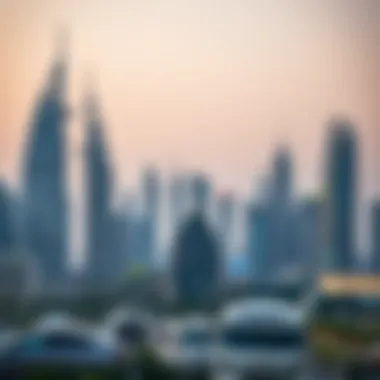

Market Trends
Current Real Estate Market Overview
Dubai's real estate market is as dynamic as the city itself, presenting a compelling blend of innovation, opportunity, and cultural richness. In recent years, it has seen a noticeable shift toward a more buyer-friendly environment. Prices that once soared sky-high are now stabilizing, giving potential homeowners and investors some breathing space.
The overall market reflects a mixed bag of trends. For instance, luxury villas in areas like Palm Jumeirah and Emirates Hills maintain their high-value status, while more affordable apartments in Dubai Marina and Downtown Dubai garner increasing interest from first-time homebuyers. The average price per square foot has experienced fluctuations, but the overall trend suggests resilience in the market, particularly in lighter economic times.
Emerging Neighborhoods and Investment Hotspots
Dubai isn't just about the iconic landmarks; countless up-and-coming neighborhoods are drawing attention as viable investment options. For those looking to stamp their mark in the real estate sector, exploring these areas can yield fruitful returns. Areas like Dubai South and Mohammed bin Rashid City are particularly notable for their development programs aimed at creating vibrant communities.
- Dubai South is centered around the Expo 2020 site, promising substantial growth fueled by infrastructure and transport links enhancements.
- Mohammed bin Rashid City boasts a mix of residential, retail, and leisure spaces, offering a holistic lifestyle that appeals to families and young professionals alike.
These hotspots not only provide diverse investment opportunities but also reflect the changing demographic preferences of the city's populace. As more expatriates and young professionals arrive, the demand for diverse housing solutions, including family-friendly communities and affordable living spaces, continues to rise.
"Dubai’s ability to adapt and evolve is its greatest strength, turning challenges into opportunities for growth."
Understanding these market trends is crucial for potential investors, as it allows them to navigate their options with a more informed perspective. With the right approach, entering the Dubai real estate market can lead to rewarding outcomes.
While the landscape is ever-changing, staying ahead requires keen attention to these developments, enabling buyers and investors alike to make strategic decisions that align with their goals.
The Essence of Dubai
Understanding Dubai goes beyond its glimmering skyscrapers and luxurious shopping malls. This city, steeped in historical context and cultural richness, serves as a microcosm of global ambition and innovation. The essence of Dubai is crucial for anyone looking to navigate its property landscape, as it provides insight into not just what the city represents, but also why it has become a focal point for real estate investment and development. Connected by a tapestry of traditions and modernities, this vibrant city offers various perspectives that significantly influence its real estate market.
Historical Context
To truly grasp why Dubai's real estate market thrives, it's essential to reflect on its historical backdrop. From the modest beginnings of a fishing village to its rapid transformation due to oil discovery in the 20th century, Dubai has continuously reinvented itself. The 1970s marked a turning point, with investments flowing in to develop infrastructure and services, attracting both expatriates and investors. The government’s strategic decision to diversify its economy after oil reserves began to dwindle led to the booming real estate sector we see today.
This evolution is evident in landmarks such as the Dubai Marina and the Burj Khalifa, symbols of the city’s willingness to dream big. The real estate market encapsulates this journey; once dominated by traditional forms of housing, it now showcases futuristic high-rises and lavish villas that set benchmarks for urban living across the globe.
Cultural Melting Pot
Dubai is famously described as a cultural melting pot. The emirate is home to a myriad of nationalities, making it an eclectic mix of cultures, customs, and languages. In a city where over 200 nationalities convene, the exchange of ideas and lifestyles is palpable. This diversity not only enriches everyday life but also shapes the property market. Real estate developers often tailor their offerings to cater to various cultural preferences, ensuring that properties resonate with a broad audience.
Indeed, this cultural blend is reflected in the architectural styles found across the city, from traditional Arabic designs to contemporary global aesthetics. The real estate sector thrives on pluralism, meaning that properties suitable for families, expatriates, and local Emiratis all co-exist, about highlighting the unique demographic needs. This adaptability is precisely what makes Dubai's property market not only lucrative but also remarkably resilient.
In summary, the essence of Dubai is encapsulated in its historical context and cultural diversity. Understanding these facets allows potential investors and stakeholders to gain a more profound insight into what makes Dubai’s real estate so attractive.
Dubai's evolution from a small fishing village to a global city is a testament to its ambition and tenacity.
For further details on Dubai's history and cultural significance, you might explore resources like Britannica or Wikipedia.
Dubai's Real Estate Market Overview
Dubai's real estate market stands out as a beacon of investment potential and growth in the region. With its unique blend of modernity and tradition, the emirate attracts a diverse mix of investors, from local entrepreneurs to international buyers seeking a piece of this dynamic landscape. The significance of this market can be summed up with a simple, yet profound observation— it’s not just about property; it’s about opportunity and lifestyle.
Real estate in Dubai offers insights into not just investment, but also into the city’s evolving identity. The rapid expansion of the skyline, dotted with iconic structures, is a physical manifestation of the emirate's ambition. As an investor or potential buyer, understanding the nuances of this market gives you an edge in navigating its complexities. Here are some key considerations to keep in mind:
- Diverse Market: From luxury villas in Palm Jumeirah to high-rise apartments in the heart of Downtown, Dubai’s real estate caters to varied tastes and budgets.
- Strong ROI: The potential return on investment is a significant draw. Many properties yield attractive rental returns, making them appealing to investors.
- Simplified Regulations: The easing of property laws has invited foreign investments. This has made the process not just more straightforward, but also more accessible.
The landscape is ever-changing, influenced by global trends and local demands. Keeping an ear to the ground on what's new and what's next is crucial for anyone looking to deepen their engagement with this marketplace, thus, let’s delve deeper into the specific elements shaping Dubai’s real estate scene.
Market Trends and Developments
Dubai’s real estate landscape is a microcosm of market fluctuations, emerging trends, and developmental strides. The pulse of this market is dictated by factors such as economic conditions, consumer preferences, and technological advancements.
Recent years have seen a noticeable shift in buying patterns, notably due to a surge in demand for sustainable and community-centric developments. More buyers are favoring properties that not only promise comfort but also prioritize sustainability. Developers are responding with eco-friendly designs and materials. The following trends exemplify the current movement in the market:
- Rise of Mixed-Use Developments: Integrated communities that offer residential, retail, and leisure spaces, like Dubai Creek Harbour, are increasingly popular, providing convenience and enhancing lifestyle options.
- Luxury Segment Resilience: High-end properties still attract significant interest, particularly among foreign wealth, as the region continues to be a safe haven during turbulent times.
- Technological Integration: The adoption of smart home technology is becoming the norm. Properties equipped with IoT devices have a competitive edge in attracting buyers.
"With the UAE’s vision towards innovation and sustainability, the real estate sector is being reshaped to meet future demands with foresight."
Investment Opportunities
Investing in Dubai’s real estate offers not just a stake in property but also access to a thriving economy. The emirate remains a magnet for investors, driven by favorable regulations and a booming tourism sector. Here are a few avenues ripe for investment:
- Residential Properties: With a growing population, there’s a consistent demand for homes, whether they be in apartments or villas. The rental market continues to flourish, providing steady cash flow.
- Commercial Real Estate: The demand for office spaces is also on the upswing, especially with the exodus towards flexible workspaces and co-working environments. Areas like Business Bay see great demand.
- Off-Plan Properties: Many investors are opting for off-plan projects, where they can engage with developers during the construction phase, often at a lower entry price. Brands like Emaar and Damac are known for their transformative projects in this category.
Each of these investment paths carries its own set of risks and rewards, hence thorough market research and possibly consulting with local experts can help mitigate risks. Embracing the cultural shifts and advancements within Dubai’s property sector can lead to fruitful insights, guiding investors toward profitable opportunities.
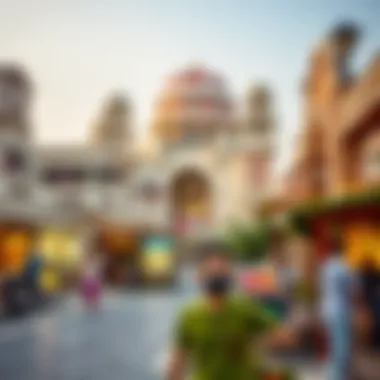
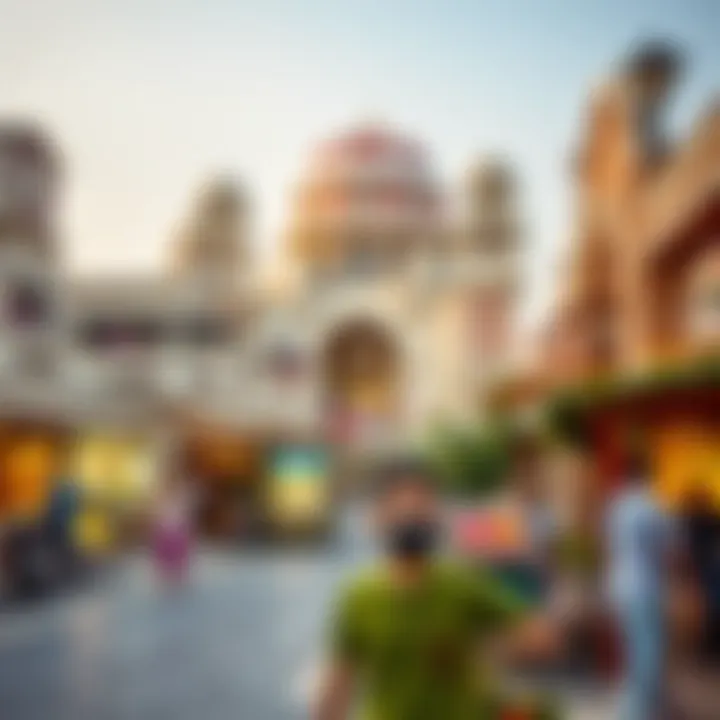
Key Neighborhoods
When talking about Dubai, key neighborhoods play an essential role in understanding the real estate landscape. Each neighborhood has its own distinct character and draws in various types of residents and investors. This diversity not only influences property values but also reflects the broader cultural and social dynamics of the city. Investors and buyers should consider the unique offerings of each area to make informed decisions that align with personal or business goals.
Downtown Dubai
Iconic Landmarks
Downtown Dubai is where the skyscrapers stretch ever upward and the energy of the city pulsates through every corner. It's home to some of the most recognizable landmarks, like the Burj Khalifa and Dubai Mall. The Burj Khalifa, being the tallest building in the world, stands as a symbol of ambition, attracting tourists and expats alike. This neighborhood is pivotal not only for its striking architecture but also for its economic impact, drawing retail and hospitality investments.
Its unique feature is the Dubai Fountain, choreographed to music, creating a mesmerizing visual spectacle. Such landmarks serve as magnets, enticing both tourists and potential homeowners. However, the downside may lie in high property prices, driven by demand for proximity to these attractions.
Real Estate Developments
The real estate developments in Downtown Dubai showcase a blend of luxury and modernity. From high-end apartments to sprawling commercial spaces, the diversity of options caters to a wide audience. One of the standout points is the Dubai Opera precinct, offering residents and visitors a unique cultural experience alongside residential living. This integration of culture with real estate makes it a magnet for investment.
However, one must note that with the rapid development, there can be project delays or fluctuations in pricing. Potential buyers should be keenly aware of these factors, balancing ambition with practicality.
Dubai Marina
Recreational Amenities
At Dubai Marina, one finds a carefully crafted waterfront community that seamlessly integrates leisure with luxurious living. The beach, parks, and an array of cafes and eateries create an inviting atmosphere. The Marina Walk flanked by luxurious yachts is a bustling hub, providing residents a lifestyle wrapped in leisure. The proximity to the beach is another appealing factor for families and young professionals.
The vibrant nightlife and community parks add to its appeal, but high foot traffic can lead to congestion, especially during peak times. Still, the recreational amenities here genuinely enhance the living experience, making it a hot spot for rental investments.
Residential Options
Dubai Marina's residential options are diverse, with everything from high-rise luxury apartments to smaller villas. Many buildings offer stunning views of the Marina or the sea, which is a huge selling point. Places like The Torch and Cayan Tower are popular choices for those looking for stylish residences.
Buying in this area can be advantageous, given the high demand for rentals. However, one should keep in mind the round-the-clock noise and the hustle of tourist activity that comes with a popular location.
Palm Jumeirah
Luxury Living
Palm Jumeirah exemplifies opulence, embodying Dubai’s spirit of lavish living. The man-made island is renowned for its upscale villas and beachfront properties, catering to HNWIs from around the globe. Living here is about embracing a lifestyle of exclusivity, with private beaches and upscale amenities.
What sets Palm Jumeirah apart is its layout inspired by a palm tree, making it a landmark visible from space. However, high property maintenance costs and a premium on real estate here may deter some buyers, begging the question of whether the lifestyle can justify the expense.
Tourism Impact
The impact of tourism on Palm Jumeirah cannot be overstated. It attracts millions annually, boosting local businesses while enhancing property values. Iconic attractions like the Atlantis, The Palm and Aquaventure Waterpark act as major draws, creating a bustling economy around hospitality and retail.
Yet, the influx of tourists can affect the tranquility expected in a luxury neighborhood. Noise and increased traffic, especially during peak seasons, present challenges for residents. Balancing tourism's economic benefits against its disruptions remains a consideration for investors and buyers alike.
Regulatory Environment
The regulatory environment in Dubai plays an essential role in shaping the real estate landscape, affecting everything from market stability to investment attractiveness. Being in the United Arab Emirates, Dubai boasts a legal framework that is tailored to attract foreign investment while ensuring property buyers' rights are protected. Understanding these regulations is crucial for stakeholders—be it investors, agents, or buyers—who seek to navigate this vibrant marketplace.
Property Ownership Laws
Dubai has unique property ownership laws that give buyers and investors a sense of security and opportunity. Foreigners can fully own properties in designated areas, commonly known as freehold zones. This structure enables expatriates to invest in the local market without the fear of losing ownership to the complexities often associated with leasehold agreements that prevail elsewhere in the region.
Key aspects include:
- Freehold Ownership: Areas like Dubai Marina and Palm Jumeirah allow complete ownership.
- Leasehold Properties: Typically has a term of 99 years but still allows significant control over the property.
- Cooling-off Period: Once a purchase agreement is signed, a cooling-off period allows buyers to back out with set terms.
Comprehending these laws is paramount as they dictate not just the way properties can be acquired, but also implications for financing and resell potential. Moreover, seeking local legal advice can help avoid any unexpected hurdles or misunderstandings.
Real Estate Regulations
Real estate regulations form the guideline framework within Dubai's property market. They are designed to promote ethical business practices, regulate real estate agencies, and uphold the integrity of transactions. Key regulatory bodies like the Dubai Land Department (DLD) and the Real Estate Regulatory Agency (RERA) exist to oversee real estate transactions and enforce compliance.
Important regulations to note:
- Escrow Accounts: Developers are required to keep buyer funds in escrow accounts, safeguarding the investments and ensuring that projects are completed on time.
- Rental Laws: Governed by the Rental Disputes Center, these laws address tenancy rights and ensure fair practices in rental agreements.
- Real Estate Brokers’ Code of Ethics: Brokers must be licensed and adhere to a strict code of conduct to maintain their credentials.
These regulations create a smoother, transparent process for all parties involved. They define responsibilities and protect rights, which ultimately fosters confidence in the real estate market.
"A well-regulated market can provide a balanced approach that benefits both buyers and sellers, ensuring long-term growth and stability."
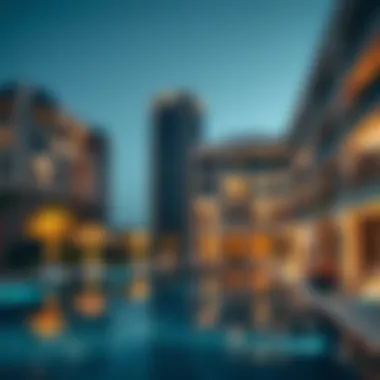

In essence, a solid grasp of the regulatory environment is imperative, not only for compliance but also for making informed investment decisions in Dubai's dynamic landscape.
The Role of Technology in Real Estate
In today's fast-paced world, technology has weaved itself into the very fabric of the real estate market, changing how people buy, sell, and even think about property. In Dubai, where innovation is a cornerstone of the city's identity, the role of technology cannot be overstated. It not only streamlines processes but also enhances decision-making for investors, buyers, and professionals. Understanding the influence of technology is vital for anyone engaged in Dubai's evolving real estate landscape.
Technological advancements have opened myriad avenues in real estate, making it indispensable for successful transactions and streamlined operations. By harnessing the power of cutting-edge tools and applications, stakeholders can enhance their efficiency and gain a competitive edge.
PropTech Innovations
The term "PropTech" envelops the various technologies propelling the real estate sector into the future. Innovations include a range of applications from AI-driven analytics to blockchain-based transactions. For instance, Artificial Intelligence has ushered in a new era of property management by providing insights through data analysis. AI algorithms can predict market trends, assess property values, and even recommend personalized properties to clients based on their preferences.
Blockchain technology is another game-changer. Its ability to offer transparency and security in transactions can't be ignored. Buyers and sellers can execute documents and transfer ownership with a level of authenticity and speed that was previously unimaginable. Furthermore, this tech significantly reduces transaction costs due to fewer intermediaries involved.
While these advancements paint an exciting picture of the future, it’s crucial to acknowledge challenges such as high entry costs for adopting these technologies and the necessity for skilled personnel to implement them. Still, the benefits far outweigh the drawbacks for those willing to invest.
Virtual Tours and Sales
Virtual tours have revolutionized how real estate is marketed, allowing potential buyers to explore properties without having to step outside. This method aligns with the fast-moving lifestyle of Dubai residents and its international clientele. Using 360-degree video technology, real estate agents can create immersive experiences that allow potential buyers to navigate rooms and even visualize furniture placement, all from the comfort of their sofa.
Additionally, in a city that thrives on global investment, virtual tours are a cost-effective way to reach international markets. A buyer in London can view luxury apartments in Dubai as easily as sipping a cup of tea—not only saving time but also travel expenses.
"In a world where time is money, virtual tours bring the market to your fingertips, making property hunting as simple as clicking a button."
Moreover, these tools can be especially beneficial during times of uncertainty, such as the recent global pandemic, when physical viewings could be compromised. With features that include live chats during the tour, questions can be addressed in real-time, enhancing the customer experience.
Sustainability in Dubai
Dubai stands at a crossroads where luxury meets responsibility. The imperative for sustainability has crept its way into the city’s DNA, influencing decision-making in both the real estate and urban planning sectors. Given its rapid urbanization, the city faces unique challenges — from the soaring temperatures that push energy consumption into overdrive, to the pressing need for eco-friendly solutions that respect both the environment and its inhabitants. Here, sustainability isn’t just a buzzword; it’s a necessity for ensuring the longevity of this bustling metropolis while maintaining its appeal as a global hub for investment and tourism.
Green Buildings
One of the most riveting aspects of sustainability in Dubai is the rise of green buildings. These aren’t just structures made of glass and steel; they are frameworks designed with a conscientious mindset towards the environment. For instance, the Sustainable City project is a triumphant example, boasting energy-efficient homes, solar panels, and even a variety of species living harmoniously with humans.
The benefits of green buildings are manifold:
- Lower Operating Costs: By utilizing smarter energy systems, owners save on utility bills.
- Better Indoor Air Quality: Enhanced ventilation systems lead to healthier living spaces.
- Improved Property Value: Green certifications can significantly boost market appeal, attracting eco-conscious buyers.
Furthermore, as the UAE aims to meet the objectives outlined in the UAE Vision 2021, there’s an undeniable push for building designs that minimize waste and maximize resources. Regulatory bodies have also begun enforcing stringent guidelines for achieving green certifications, making it easier for developers and investors to align their projects with sustainable goals.
Sustainable Urban Development
The concept of sustainable urban development is effectively reshaping Dubai's skyline and environment. This goes beyond just individual buildings; it expands to entire neighborhoods designed with the future in mind. The Dubai 2040 Urban Master Plan seeks to enhance the quality of life for residents, incorporating green spaces, improved public transport, and pedestrian-friendly pathways.
These developments show the city’s commitment to creating a livable urban environment. Here are key points worth noting:
- Integrated Transport: The city is working on expanding public transport means, facilitating easier access to and from residential areas, thus reducing reliance on cars.
- Public Parks and Green Spaces: Simple yet effective, more parks can lead to healthier, happier communities, providing spaces for relaxation and recreation amidst the desert landscape.
- Community Initiatives: The Dubai municipality promotes grassroots movements that encourage recycling, energy conservation, and community involvement in local environmental efforts.
Allocating funds towards sustainable urban development is a wise investment; research suggests that cities prioritizing sustainability often witness a surge in economic growth alongside enhanced living conditions.
"Sustainability is not a choice; it's a responsibility. It shapes our future and preserves the essence of Dubai for the generations to come."
Both green buildings and urban development focus on creating a genuine sense of community while mitigating the effects of urban sprawl. For investors, the integration of sustainability elevates property value, calls for innovation, and aligns with global market trends leaning towards environmentally conscious practices. As Dubai continues to evolve, its commitment to sustainability serves as a benchmark for future developments—not merely in the UAE, but across the globe.
[Further Reading on Sustainable Development] (https://en.wikipedia.org/wiki/Sustainable_development) [More on Dubai’s Green Building Council] (http://www.dubaicouncil.gov.ae)
Future Prospects
As Dubai continues to cement its status as a global hub for trade, tourism, and finance, the future of its real estate landscape looks more promising than ever. The ongoing investments in infrastructure and sustainable development, paired with a diverse market, offer a plethora of opportunities for various stakeholders, including investors, property managers, and homebuyers. Understanding the future prospects of Dubai's real estate market is essential for making informed decisions in an environment that's ever-evolving.
Predicted Market Growth
The anticipated growth of the property market in Dubai comes from several critical factors. First and foremost is the government’s commitment to innovation and modernization. Initiatives such as the Dubai 2040 Urban Master Plan aim to enhance the city’s livability while expanding the available real estate options. As the tourism sector rebounds post-pandemic, demand for both residential and commercial properties is expected to surge.
Some key indicators include:
- Foreign Direct Investment: Increased interest from global investors is shifting the local market landscape. With measures in place to simplify buying procedures for expats and foreigners, new investments will inevitably boost market growth.
- Population Growth: As more people migrate to Dubai for work and lifestyle, the local demand for housing options will intensify, further driving property values.
- Mega Events: Hosting major international occurrences like Expo 2020 has not only bolstered the city’s visibility but has also laid the groundwork for sustainable growth in real estate. These events attract both short-term and long-term investors spurring a boost in various sectors.
The overall market sentiment is upbeat, and growth predictions suggest a positive trend over the next decade, making now an opportune moment for entry into Dubai’s market.
Emerging Trends
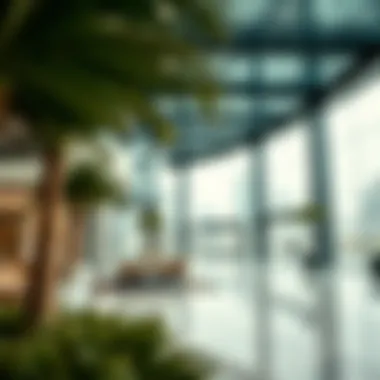
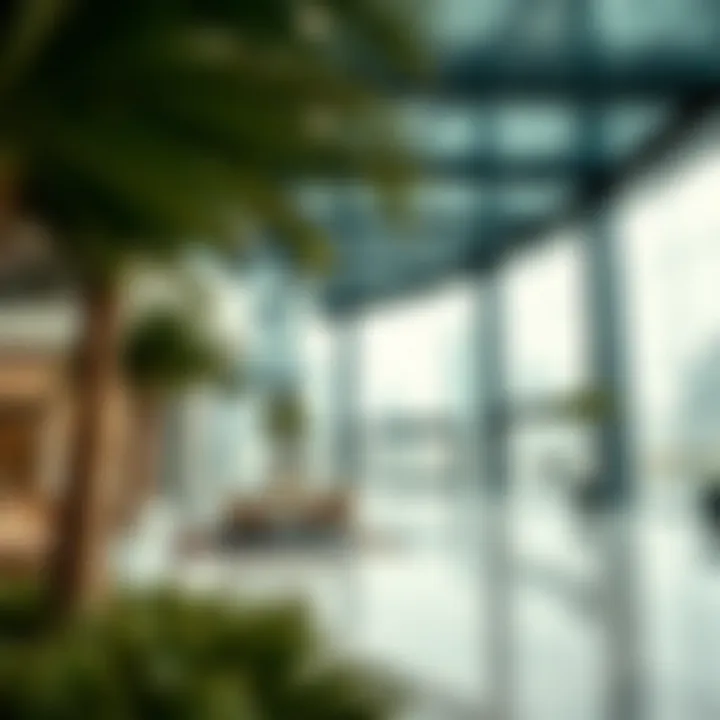
Several trends are beginning to shape the future of Dubai's real estate landscape, indicating a shift in buyer preferences and technological integration:
- Sustainable Development: Builders are leaning toward eco-friendly materials and practices. The rise of green buildings not only aligns with global sustainability goals but also attracts environmentally-conscious buyers, making them more marketable.
- Technological Integration: The adoption of smart home technologies is on the rise. Buyers are increasingly favoring properties equipped with automation systems, energy management, and security features. This trend merges convenience with cutting-edge technology, appealing to a diverse clientele.
- Flexible Workspaces: With the increase in remote work, commercial spaces targeting this demographic are thriving. Co-working spaces in strategically located areas cater to businesses that seek flexibility without compromising visibility.
"The future of Dubai's real estate is not just about buildings; it's about building communities that sustain themselves and adapt to the needs of their residents."
Investors should remain alert to these emerging trends as they can significantly affect property values and rental yields. Keeping an eye on these developments will help discerning buyers and industry professionals navigate Dubai’s complex yet dynamic real estate waters.
Challenges in the Real Estate Sector
The real estate sector in Dubai, while brimming with potential, is not without its hurdles. Understanding these challenges is crucial for investors, agents, and buyers seeking to navigate this dynamic landscape. Addressing issues like market volatility and regulatory changes can determine both short-term decisions and long-term strategies in real estate investments. Recognizing these complexities not only enhances decision-making but also prepares stakeholders for the realities of the market, ensuring more informed and fruitful engagements.
Market Volatility
Market volatility is a double-edged sword in Dubai’s real estate sector. It presents opportunities, but it also raises risks that can catch investors off guard. Prices can swing widely depending on multiple factors, including global economic conditions, oil prices, and even geopolitical events.
For instance, in the aftermath of the COVID-19 pandemic, property prices in some areas saw unexpected drops. Conversely, luxury developments experienced a rebound in demand as expatriates sought larger, more spacious residences due to increased remote work flexibility.
Potential buyers should consider the following:
- Monitor economic indicators: Keeping an eye on GDP growth and changes in oil markets can forecast trends in real estate prices.
- Diversify investments: Not placing all your eggs in one basket can help mitigate risks associated with price swings.
- Timing is key: Knowing when to buy or sell can greatly influence profitability.
"Understanding the oscillating nature of market prices in Dubai not only protects investments but can enhance investment opportunities."
Regulatory Changes
The real estate landscape in Dubai is also shaped by a regulatory environment that is continually evolving. Changes in property laws, tax reforms, and foreign ownership regulations can have immediate impacts on the market. For instance, recent adjustments in ownership laws have made it easier for foreigners to buy property, which has led to a surge in demand in certain districts. However, these changes can also create confusion for investors unfamiliar with the evolving landscape.
Key considerations regarding regulatory changes include:
- Stay updated on legal adjustments: Following local government announcements and engaging with real estate professionals can provide insights into forthcoming changes.
- Understand the implications: Knowing how regulations affect property values and ownership rights can safeguard investments.
- Consult experts: Working with legal and real estate experts can help navigate the complexities posed by shifts in law, ensuring compliance and strategic advantage.
In essence, the ability to adapt to regulatory shifts can significantly influence one's success in the Dubai real estate market. Investors who remain informed and responsive are often the ones who emerge unscathed, if not enriched, by the complexities of this vibrant sector.
Insights from Industry Experts
When diving into the complex real estate landscape of Dubai, it becomes immediately clear how valuable insights from industry experts can be. These professionals, who live and breathe the nuances of the market, provide a treasure trove of information that can help investors and stakeholders make informed decisions. They act as a compass, guiding through the often turbulent waters of property investments, market dynamics, and future trends.
Interviews with Real Estate Leaders
In recent discussions with leading figures in Dubai’s real estate sector, several key themes emerged. One common thread was the idea that understanding the cultural context is paramount. As Ahmad Al Juma, an influential developer, put it: "The soul of a property lies not just in its architecture but in how it resonates with the people who call it home."
In interviews, experts like Sara Al-Mansoori from Emaar Properties stressed the importance of sustainability in current developments. She remarked, "People are not just looking for luxury; they're asking for responsible living. Buildings which integrate eco-friendly technology attract more buyers today than ever before."
Additionally, many executives emphasized the unpredictability of the market. Rami El-Feghali, a prominent real estate analyst, noted how external factors such as global economic shifts can dramatically impact demand. He stated, "Investors must keep an eye on the global landscape and local policies. What might seem like a strong market can shift due to external pressures."
Market Analysis Commentary
Market analysis, informed by expert commentary, plays a crucial role in understanding the shifting sands of real estate in Dubai. According to local analysts, trends show growing interest in off-plan properties, as many buyers view this as an opportunity to secure a property at a lower price in a high-demand area.
Moreover, as highlighted by industry reports, there is notable growth in the luxury sector, with properties on the Palm Jumeirah seeing a sharp uptick in interest, especially from foreign investors. Such changes reflect broader international trends and localized developments, showing that those who dig deep into expert commentary can grasp the real motivations and drivers behind the market.
"The difference between lost investment dollars and successful ventures often lies in the insights shared by those who know the industry inside out."
In summary, the conversations and analysis provided by industry experts serve not just to inform but also to inspire confidence among investors and stakeholders. They illuminate the path ahead, showcasing both opportunities and potential pitfalls, thus crafting a richer narrative around Dubai's ever-evolving real estate landscape.
Epilogue and Recommendations
In wrapping up this analysis of Dubai's real estate landscape, it becomes clear that the city's property market is a microcosm of its dynamic and multifaceted identity. As we’ve seen throughout the article, Dubai has successfully blended modern architectural marvels with its rich cultural tapestry, creating a unique environment for investors and homebuyers alike. In this conclusion, we offer several recommendations and key insights that can benefit those engaged in this vibrant market.
Successful navigation through Dubai's real estate sector is not simply about understanding prices or regulations; it requires an appreciation of the local culture and a forward-thinking approach in investments. The diverse investment opportunities here encompass both residential and commercial spaces, catering to varied portfolios.
Purchasers must keep an eye on emerging trends while leaning on solid data to inform their decisions. Rapid changes in market conditions, shifting preferences, and evolving regulatory frameworks all pose challenges but also unveil potential opportunities. Assessing these factors thoughtfully can turn the tide in one’s investment journey.
Key Takeaways
- Diverse Opportunities: The real estate market offers a mix of luxury, affordable housing, and commercial placements, appealing to a wide range of investors.
- Cultural Consideration: Understanding Dubai's cultural dynamics enriches investment strategies and attracts a more substantial customer base.
- Continuous Learning: Staying updated with market trends and legal regulations through credible channels can minimize risks associated with investment in property.
- Technology Adoption: Embrace digital platforms for better marketing, showcasing properties through virtual tours, or navigating transactions—these can provide a competitive edge.
Future Directions
Looking forward, it’s essential to keep a pulse on several key areas that may shape the future of Dubai’s real estate landscape:
- Sustainability: The push for green buildings and sustainable urban development is reshaping not just the city’s architecture but investment interests.
- Young Demographics: With an influx of younger residents seeking quality living conditions in urban settings, innovative housing solutions that cater to their needs will flourish.
- Technological Integration: Continued advancements in PropTech will further reduce transaction times and improve customer experience.
- Changing Regulations: As the government continues to adapt its policies to attract foreign investors, keeping abreast of these changes will position investors favorably.
"Investment isn’t just about transactions; it's about making informed choices that resonate with your vision of the future."
In summary, Dubai's real estate scene unfolds like a tapestry, where each thread reflects a unique opportunity or challenge. For real estate professionals, investors, and even prospective homeowners, a well-informed and strategic approach towards engaging with this vibrant market could yield substantial rewards. As the city continues to evolve, aligning perspectives with its growth trajectory will be paramount.







